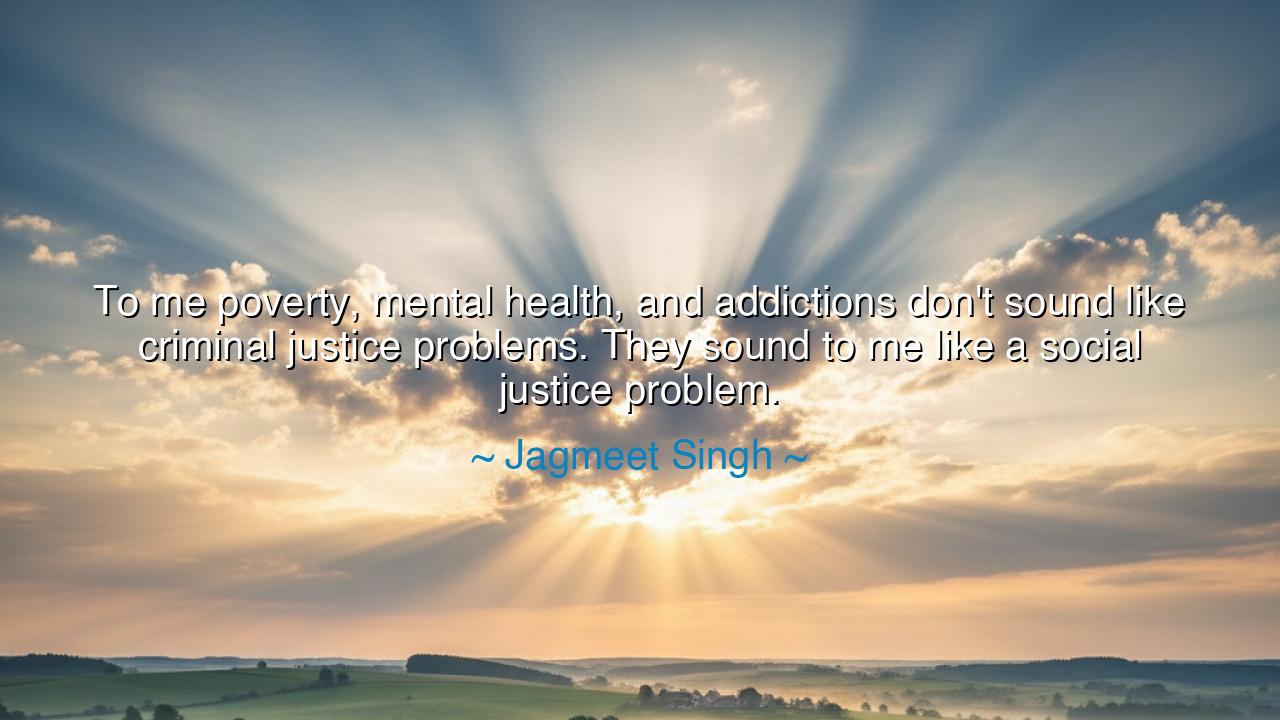
To me poverty, mental health, and addictions don't sound like
To me poverty, mental health, and addictions don't sound like criminal justice problems. They sound to me like a social justice problem.






The leader and advocate Jagmeet Singh, known for his fierce compassion and moral clarity, once declared: “To me poverty, mental health, and addictions don't sound like criminal justice problems. They sound to me like a social justice problem.” In these words, he draws a line between punishment and understanding, between vengeance and compassion. His statement is not merely political—it is philosophical, even prophetic. For in speaking thus, Singh reminds humanity of a truth the ancients themselves once knew: that suffering is not a crime, and that the measure of a society is not how it punishes its wounded, but how it heals them.
In the old world, the wise rulers and philosophers spoke often of justice, but they did not speak of it as the cold machinery of law—it was a virtue of the soul. Aristotle called it the highest of all virtues, for through justice, all others find their place. Yet he warned that justice must be guided by equity—a sense of mercy and understanding that considers the human heart. What Singh reveals in his words is that modern nations have forgotten this balance. Too often, those who fall into poverty, who battle addiction, or who suffer in mental illness, are treated not as the wounded, but as the wicked. Their struggle is met not with aid, but with arrest. And thus the law, instead of serving as healer, becomes a hammer that deepens the wound.
To see addiction and mental illness as criminal issues is to misunderstand their nature. They are not the fruits of moral decay, but of pain, of history, of circumstance. The ancient physician Hippocrates taught that no malady could be cured by punishment. If the body is sick, it requires medicine; if the mind is sick, it requires compassion. Yet our age, in its haste and its fear, builds prisons where it should build hospitals, and shames where it should listen. Singh’s words challenge this false order. He calls for the wisdom to see the human being not through the lens of crime, but through the eyes of community. For what we call social justice is nothing less than the restoration of the harmony that injustice has broken.
History offers its own lessons on this truth. In the nineteenth century, the reformer Dorothea Dix walked through the asylums and prisons of America and saw horrors that would chill the soul—men and women chained, beaten, forgotten, their only crime being madness or poverty. She did not turn away. She fought not to condemn them, but to heal them. Her voice rose before the halls of power, saying, “I tell what I have seen.” Because of her courage, hospitals for the mentally ill began to rise where dungeons once stood. In this, we see the very spirit of Singh’s teaching: that justice without compassion is not justice at all, but cruelty wearing the mask of order.
When Singh speaks of social justice, he reminds us that society itself is a living body. If one limb is sick, the whole body suffers. Poverty is not an individual failure—it is a wound in the collective soul. To heal it is not charity, but wisdom. To criminalize it is folly. The same is true of addiction, that most misunderstood affliction. Those who fall to its grip do not choose destruction; they fall seeking relief from pain. To meet their suffering with prison bars instead of open hands is to abandon them—and in doing so, to abandon our own humanity. The ancients would have called such neglect a spiritual illness, a loss of balance between justice and mercy.
The origin of Singh’s conviction lies in his own vision of politics as service—a belief that leadership is not domination, but healing. He speaks as one who sees the world’s brokenness not as a curse to endure, but as a duty to mend. His insight springs from the modern crisis of inequality, where those in despair are often cast aside. But it also flows from the eternal truth that every generation must rediscover: that the strength of a civilization lies in how it treats its weakest members. The wise ruler, the philosopher-king, the prophet—all have said the same in their own tongues. Singh joins this chorus, his words a call to remember what justice truly means.
So let the lesson be this: do not mistake punishment for justice, nor indifference for strength. To build a just society, one must look upon the suffering of others and say, “This is not their burden alone—it is ours.” Each person must become both healer and builder, mending the wounds that ignorance and cruelty have left. Support systems that feed the hungry, heal the sick, and restore dignity to those who have lost it. Demand that your communities treat mental health not as shame, but as part of life. Work not only for order, but for compassionate order—for justice that lifts rather than crushes.
Thus, in the spirit of the ancients and the voice of the modern sage, Jagmeet Singh’s words endure as both rebuke and revelation. He reminds us that justice without mercy is tyranny, and that mercy without justice is chaos. Between the two lies the golden path: the way of social justice, where healing and accountability walk hand in hand. To walk this path is not easy—but it is the only road that leads to peace, not only between people, but within the human soul itself.






AAdministratorAdministrator
Welcome, honored guests. Please leave a comment, we will respond soon